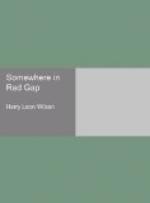“And the little brute hung up on her!”
II
MA PETTENGILL AND THE SONG OF SONGS
The hammock between the two jack pines at the back of the Arrowhead ranch house had lured me to mid—afternoon slumber. The day was hot and the morning had been toilsome—four miles of trout stream, rocky, difficult miles. And my hostess, Mrs. Lysander John Pettengill, had ridden off after luncheon to some remote fastness of her domain, leaving me and the place somnolent.
In the shadowed coolness, aching gratefully in many joints, I had plunged into the hammock’s Lethe, swooning shamelessly to a benign oblivion. Dreamless it must long have been, for the shadows of ranch house, stable, hay barn, corral, and bunk house were long to the east when next I observed them. But I fought to this wakefulness through one of those dreams of a monstrous futility that sometimes madden us from sleep. Through a fearsome gorge a stream wound and in it I hunted one certain giant trout. Savagely it took the fly, but always the line broke when I struck; rather, it dissolved; there would be no resistance. And the giant fish mocked me each time, jeered and flouted me, came brazenly to the surface and derided me with antics weirdly human.
Then, as I persisted, it surprisingly became a musical trout. It whistled, it played a guitar, it sang. How pathetic our mildly amazed acceptance of these miracles in dreams! I was only the more determined to snare a fish that could whistle and sing simultaneously, and accompany itself on a stringed instrument, and was six feet in length. It was that by now and ever growing. It seemed only an attractive novelty and I still believed a brown hackle would suffice. But then I became aware that this trout, to its stringed accompaniment, ever whistled and sang one song with a desperate intentness. That song was “The Rosary.” The fish had presumed too far. “This,” I shrewdly told myself, “is almost certainly a dream.” The soundless words were magic. Gorge and stream vanished, the versatile fish faded to blue sky showing through the green needles of a jack pine. It was a sane world again and still, I thought, with the shadows of ranch house, stable, hay barn, corral, and bunk house going long to the east. I stretched in the hammock, I tingled with a lazy well-being. The world was still; but was it—quite?
On a bench over by the corral gate crouched Buck Devine, doing something needful to a saddle. And as he wrought he whistled. He whistled “The Rosary” shrilly and with much feeling. Nor was the world still but for this. From the bunk house came the mellow throbbing of a stringed instrument, the guitar of Sandy Sawtelle, star rider of the Arrowhead, temporarily withdrawn from a career of sprightly endeavour by a sprained ankle and solacing his retirement with music. He was playing “The Rosary”—very badly indeed, but one knew only too well what he meant. The two performers were distant enough to be no affront to each other. The hammock, less happily, was midway between them.




